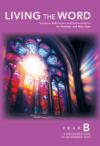Scripture Study for
Nineteenth Sunday in Ordinary Time
Wisdom 18:6–9 / Psalm 33:12b / Hebrews 11:1–2, 8–19 [11:1–2, 8–12] / Luke 12:32–48 [12:35–40]
<< Back to LECTIONARY RESOURCES
Understanding the Word
By Br. John R. Barker, OFM
The reading from Wisdom is part of a lengthy passage (10:1–19:22) that rehearses the role of Wisdom as the active, providential power of God in times of trouble, especially in Israel’s Exodus experience. As a preparation for the last plague, the death of the firstborn, God had warned the people and given the Passover sacrifice instructions to protect them from the plague (Exodus 12:1–23). The people put their trust in God on the basis of God’s promises to Abraham and to Moses to deliver them from bondage (Genesis 15:13–16; Exodus 6:8; 13:5). When the plague came and Israel was safe, they were “glorified,” which here means lifted up and seen as God’s chosen people, protected—as so often in Israel’s history—from harm.
Having developed his discussion of Christ as the eternal High Priest who intercedes for us in the heavenly sanctuary, the author of Hebrews now turns to the Christian response to this reality. While it is true that Christ intercedes for sinners, this does not make sin a light matter. On the contrary, one must strive to overcome sin, a struggle that can only be undertaken with firm faith in God’s promises (10:23). The author’s definition of faith is not precise, but it does address both faith’s subjective and objective aspects. “Realization of what is hoped for” points to recognition of the divine promises for those who persevere, whereas “evidence of things not seen” refers to the witness of those who have gone before, attesting to God’s trustworthiness. Because he understood the promises of land, blessing, and descendants, Abraham left his homeland as God directed (Genesis 12:1–6). Although the fullness of the promises was not realized in their lifetimes, the ancients died trusting that they would be fulfilled one day.
Jesus has been exhorting his disciples to maintain courage in the face of persecution (12:2–8), trusting that the Holy Spirit will guide them (12:11–12) and that God will provide for them (12:16–31). This all means that they need not be afraid: of persecution, of being abandoned by God, or of not having the things they need. If they have faith, they will possess the one thing necessary: the kingdom of God, which the Father is “pleased to give you.” The lesson about being watchful can apply either to the return of Christ or to the death of the individual. In either case, the point is that we should be about the things God has given us to do, whatever they are. The remarkable image of a master serving his servants when he finds them about his business illustrates vividly the generosity of God, which far exceeds human generosity, in bestowing the kingdom.
